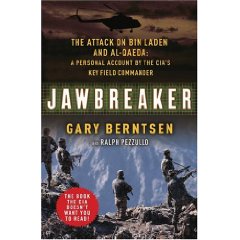The book would normally lose one star for failing to be current with the varied sources pertinent to the story, including Sy Hersh's excellent story on how Secretary of Defense Rumsfeld gave the Pakistani's an air corridor with which they evacuated close to 3,000 Taliban and Al Qaeda leaders over the course of one night. I believe the author of this book when he says that Bin Laden was not among those so evacuated–Bin Laden's style would be to distrust a Pakistani offer of air evacuation, and to want to lead his men directly over ground to sanctuary.
Before detailing my extensive notes on this book, let me just note that it cannot be fully appreciated if you cannot read between the lines (for myself, as a former clandestine case officer, this is perhaps easier, but I find the whining about redaction from some reviewers to be naive–the redacted sections are veils, to be sure, but helpful in being shown). This book is also best appreciated if you have first read Charlie Wilson's War: The Extraordinary Story of the Largest Covert Operation in History; Ghost Wars: The Secret History of the CIA, Afghanistan, and Bin Laden, from the Soviet Invasion to September 10, 2001 and The Main Enemy: The Inside Story of the CIA's Final Showdown with the KGB as well as the book by the author's predecessor in field command, First In: An Insider's Account of How the CIA Spearheaded the War on Terror in Afghanistan I have reviewed all those books–if you don't want to buy and read them, at least read the reviews as preparation for a full appreciation of this book. If you can find it, a used copy of The Black Tulip: A Novel of War in Afghanistan is both fun read and provides atmosphere.
A few points really jump out at me and make my fly-leaf notes:
1) The author takes a reasonable shot at “First In” by pointing out that he led a team into the area in 2000 to deliver radio intercept training to the Northern Alliance.
2) He carefully documents that George Tenet's “declaration of war” was meaningless, and not backed up by either resources or management commitment. Tenet was a world-class posturer obsessed with pandering to the President and unwilling to actually lead the operators. The author provides what may be one of the best and most factual accounts of Directorate of Operations petty politics, backstabbing, and minor jealousies. The author specifically slams the Latin America Division Chief for being a chickens–t who ordered his officers to NOT volunteer after 9/11 even if they had relevant languages and experiences, and he accuses both Tenet and Jim Pavitt, then the nominal head of the Directorate of Operations (nominal because I never considered him to actually be competent) of panicking after 9/11 and as the Counter-Terrorism Center (CTC) leadership pushed the envelope and did the right things. My impressions of Cofer Black and other CTC leaders jumped up several notches on the basis of this book, and for that alone it is very worthwhile.
3) The most important strategic observation made in this book is the author's documented denouncement of George Tenet's poor judgment in closing stations in Afghanistan, Somalia, Sudan, and Tajikistan, among others, leaving CIA blind and without localized resources in the most critical years leading up to and following 9/11. The author demonstrates that he is more than just a case officer with a superb quote on page 312 in which he not only calls for a global clandestine presence, but recognizes the value of having a national cadre of “trained experts who speak the languages and show sensitivity to native cultures” and also calls for a dramatic increase in “student, cultural, and scientific exchanges” with other societies. In this context, while glossing over the CIA's general lack of languages, he noted that the Special Forces people sent to help him had no languages skills at all (relevant to this battle).
4) The author and CTC leadership get huge face with me for having the brains to go out and recruit native language speakers without college degrees, giving them the GS-13 and GS-14 grades normally reserved for PhDs. I absolutely admire the author for taking on the CIA's personnel bureaucracy and telling them in essence, “the college degree can come later, right now we need the languages and the Muslim attributes.” Absolutely spot on, this is the kind of inspired *leadership* we need in clandestine operations.
5) A few minor notes that add to the scholarship in the area of clandestine intelligence and counter-terrorism:
a) CIA relied on Northern Alliance helicopters instead of having its own capable of providing more reliable transport. This was fixed later, but the bottom line is that both CIA and the US military are completely lacking in not having a squadron of mixed aircraft (helos, VSTOL, and gunships) optimized for high altitude operations (10,000 feet to 18,000 feet).
b) Clean fuel was the major safety hazard–this taught me that one of our first priorities needs to be setting up a Forward Area Refueling Point (FARP) and having a trained fuel master responsible for ensuring clean fuel is available to all of our clandestine and special operations flights in and out of denied areas.
c) The author slams Tenet and Deutch (and David Cohen) for putting intelligence analysts in charge of stations overseas. An analyst is no more capable of managing clandestine operations than a ballerina is of coaching a football team.
d) The author documents that the Nairobi Embassy bombing was tipped in advance, but the informant was blown off (as were the two who told FBI about 9/11 in advance).
e) The author knows that our compartmentation rules are stupid, and shared *everything* with his military counterparts in the field. This worked.
In Afghanistan, for this campaign, unlike in Somalia or Iraq, the clandestine service worked as advertised. Wish that it were so for the rest of the world.





